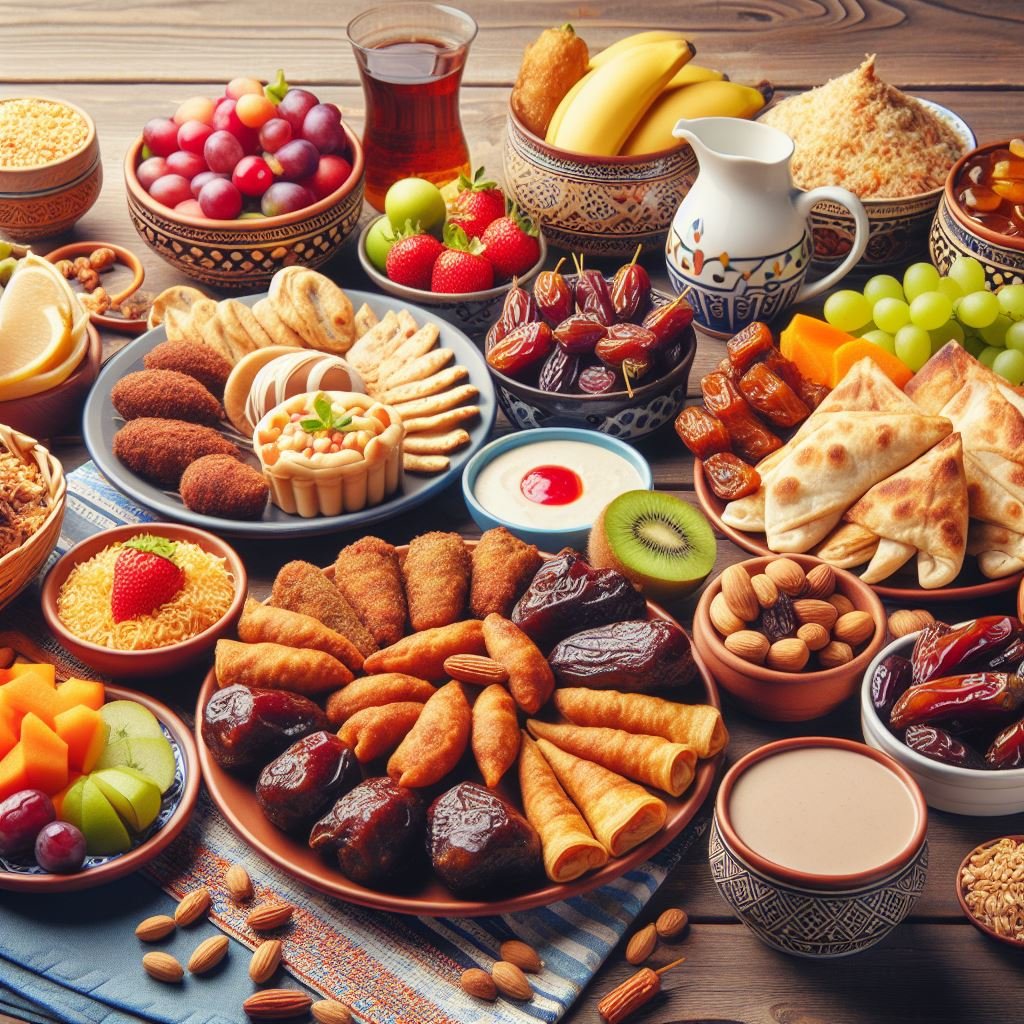In the sacred month of Ramadan 2024, the essence of culinary harmony transcends the mere act of sustenance; it becomes a profound and spiritual journey that nourishes not only the body but also the soul. As believers embark on this transformative period of fasting and reflection, the choices made in the kitchen take on heightened significance, resonating with the principles of self-discipline, gratitude, and conscious living. In this exploration, we delve into the intricate layers of understanding the essence of culinary harmony during Ramadan, highlighting the conscious approach to what is consumed, the art of controlling cravings, and the importance of making choices that align with the sacred ethos of this holy month.

Ensure you don’t overlook vital aspects of essential Islamic knowledge that everyone should know. Explore clear and authentic instructions for Ghusl (ritual bath), Wuzu (ablution), and Namaaz (prayer) in multiple languages. Additionally, discover Location-based Prayer Times, Tasbeeh Counter and Hijri Date. It is a must-read and learn knowledge for everyone.
Culinary Harmony in Ramadan: A Conscious Approach to Eating:
At the heart of understanding the essence of culinary harmony lies a conscious approach to eating. Ramadan is a month of fasting from dawn to sunset, and during this time, believers are not only refraining from food and drink but also immersing themselves in a deeper connection with their faith. Suhoor, the pre-dawn meal, holds particular significance as it becomes the foundation for sustaining energy throughout the day.
A conscious Suhoor involves thoughtful choices that nourish the body and provide sustained energy. Complex carbohydrates like whole grains, proteins from lean sources, and hydrating elements ensure a wholesome start to the day. Dates, a traditional way to break the fast, are rich in natural sugars, providing a quick energy boost.
Iftar, the meal that breaks the fast at sunset, is another pivotal moment in the culinary journey of Ramadan. Breaking the fast with dates and water is a practice rooted in tradition and is followed by a balanced meal. It is important to incorporate a mix of carbohydrates, proteins, healthy fats, and a variety of fruits and vegetables to replenish energy and vital nutrients. This conscious approach to Iftar ensures a gradual release of energy, avoiding the pitfalls of overindulgence.
Controlling Cravings: A Mindful and Spiritual Odyssey in Ramadan 2024
Fasting during the sacred month of Ramadan extends far beyond the physical act of abstaining from food; it entails a profound and spiritual endeavor to control cravings. This intentional journey of self-discipline permeates the choices made about food, transforming the act of eating into a mindful and soul-enriching experience. Controlling cravings during Ramadan becomes a practice rooted in mindfulness, encouraging believers to embark on a conscious exploration of portion sizes, the appreciation of flavors, and the resistance to impulsive desires.
The Art of Self-Discipline:
At the core of controlling cravings in Ramadan lies the art of self-discipline. The act of fasting is a testament to believers’ commitment to a higher purpose, and this discipline naturally extends to the choices made about food. It involves a conscious effort to resist the allure of immediate gratification and to embrace a more profound connection with the spiritual journey of fasting.
Self-discipline in controlling cravings transcends the mere physical act of not consuming certain foods; it delves into the psychological and spiritual dimensions of conscious decision-making. Believers cultivate a heightened awareness of their desires, acknowledging them without being swayed by impulsive urges. This intentional practice of self-discipline serves as a bridge between the physical and spiritual realms, enriching the fasting experience.
Mindful Eating as a Spiritual Practice:
Mindful eating emerges as a central aspect of controlling cravings during Ramadan, constituting an art that aligns seamlessly with the spiritual odyssey of the month. It goes beyond the mechanical act of consuming food; it is a deliberate and intentional engagement with each morsel, an appreciation of flavors, textures, and the nourishment that transcends the physical realm.
Being present in the moment is a fundamental tenet of mindful eating. Believers are encouraged to cultivate a deep awareness of their sensory experiences, from the aroma of the food to its taste and the act of chewing. This heightened state of awareness transforms eating into a meditative practice, fostering a connection with the present moment and the divine.
Appreciating the Flavors and Textures:
In the hustle and bustle of daily life, meals are often hurried affairs, and the appreciation of flavors and textures can be overlooked. Controlling cravings in Ramadan invites believers to slow down and savor each bite intentionally. The act of appreciation extends beyond the physical sustenance to a recognition of the intricate tastes and textures that make up the meal.
By deliberately paying attention to the flavors, believers unlock a deeper connection with the food they consume. The simplicity of a date breaking the fast or the richness of a well-prepared dish becomes a source of gratitude and pleasure. This appreciation of flavors becomes a conduit for spiritual nourishment, reinforcing the understanding that food is not merely fuel but a gift to be cherished.
Recognizing Nourishment Beyond the Body:
While the act of eating nourishes the physical body, controlling cravings in Ramadan invites believers to recognize nourishment beyond the corporeal. Mindful eating becomes a vehicle for acknowledging the soul’s hunger for connection, gratitude, and spiritual fulfillment. Each meal, approached with intention and consciousness, becomes a sacred act that transcends the boundaries of the material world.
Recognizing the nourishment beyond the body involves a shift in perspective – viewing food as a source of energy not only for the physical self but also for the spiritual self. The intentional and conscious approach to eating fosters a deeper connection with the divine, as believers acknowledge the intricate interplay between the act of nourishing the body and nurturing the soul.
Fostering a Deeper Connection with the Spiritual Essence:
Controlling cravings through mindful eating is more than a dietary practice; it is a spiritual journey that fosters a deeper connection with the essence of Ramadan. The intentional and conscious approach to each meal becomes a form of worship, an act of gratitude, and a recognition of the sacred nature of the fasting experience.
As believers savor the flavors, appreciate the textures, and recognize the nourishment beyond the body, they enter a state of spiritual communion. Mindful eating becomes a means of engaging with the present moment, cultivating a heightened awareness of the divine blessings inherent in each bite. This intentional connection with the spiritual essence of Ramadan elevates the act of controlling cravings from a mundane routine to a sacred and transformative practice.
Making Conscious Choices: Beyond Nutritional Considerations:
The essence of culinary harmony in Ramadan extends beyond nutritional considerations to encompass ethical and spiritual dimensions. Believers are encouraged to embrace moderation in their culinary choices, avoiding extravagance and wastefulness. Making conscious choices during this holy month involves recognizing the interconnectedness of our actions with our spiritual well-being.
Conscious choices in Ramadan are not merely about what is consumed but also about how food is sourced, prepared, and shared. Believers are reminded to be mindful of the environmental impact of their food choices, choosing sustainable and ethically sourced options. This consciousness extends to reducing food waste, a practice that aligns with the principles of gratitude and mindful living.
Avoiding Roadside, Junk, and Unhygienic Food for Good Health: A Pragmatic Approach to Well-being:
While the culinary journey in Ramadan encourages mindful and conscious choices, it is crucial to underscore the importance of avoiding roadside, junk, and unhygienic food for the sake of good health. Consuming food from unreliable sources can pose health risks, leading to digestive issues and other complications. This pragmatic approach to well-being aligns with the principles of self-care, ensuring that the body receives nourishment in a wholesome and safe manner.
Roadside and junk food, often tempting in their convenience, may lack the nutritional value required to sustain energy levels during the fasting period. Moreover, concerns about hygiene and food safety arise when indulging in such options. The essence of culinary harmony in Ramadan emphasizes not only the spiritual and mindful aspects of eating but also the pragmatic need to prioritize health and well-being.
Culinary Harmony as a Sacred Act:
In conclusion, understanding the essence of culinary harmony during Ramadan transcends the act of eating; it becomes a sacred and transformative journey. The conscious approach to what is consumed, the art of controlling cravings, and the importance of making choices aligned with spiritual principles contribute to a holistic and nourishing experience.
Avoiding roadside, junk, and unhygienic food becomes an integral part of this culinary journey, acknowledging the pragmatic need for good health. As believers navigate the culinary landscape of Ramadan, may their choices be guided by intention, mindfulness, and a profound connection with the sacred ethos of this holy month. In the union of mindful eating and spiritual consciousness, the essence of culinary harmony becomes a powerful and sacred act, fostering not only physical well-being but also the deepening of one’s spiritual journey during Ramadan.
In conclusion, controlling cravings in Ramadan is not merely a matter of self-restraint; it is a mindful and spiritual odyssey that transforms the act of eating into a sacred ritual. Through the art of self-discipline, mindful eating, and a recognition of nourishment beyond the body, believers embark on a journey that transcends the physical and delves into the spiritual essence of Ramadan. As each intentional bite becomes a moment of worship, the act of controlling cravings becomes a profound and soul-enriching practice that aligns seamlessly with the spiritual ethos of this holy month.




